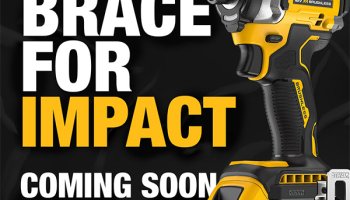
If you buy something through our links, ToolGuyd might earn an affiliate commission.
The US Consumer Product Safety Commission just held another hearing regarding table saw safety tech.
Grab some popcorn – I watched the full recording and there are some impactful statements and sentiments.
I have made efforts to include relevant statements, but following is not a complete transcript.
Most of the questions were asked by two Commissioners, Peter Feldman and Richard Trumka Jr. Feldman is against the rulemaking, Trumka is for it.
Feldman, in the context of SawStop’s refusal to license their tech to Grizzly:
“Mr. Howard [SawStop/TTS CEO], I don’t know how to view this type of response as anything other than a refusal to license your technology on any terms, let alone FRAND [fair, reasonable, and nondiscriminatory] terms.”
“Just to make sure I am allowing a full opportunity to provide the appropriate context, my question is this: is SawStop and TTS willing to engage with CPSC technical staff and stakeholders to develop a license, on FRAND terms before the final adoption of a rule in this matter, in order to allow the Commission to fully understand the effects and costs as accurately as possible?”
Matt Howard, CEO of SawStop and TTS North America:
“…I reject out of hand, within the context of our testimony today, any requirement to go through SawStop to achieve AIM implementation. We are not a gate-keeper. We are expressly working to not be a gate-keeper.”
Feldman:
“You have made no commitments beyond the ‘840 patent, and with respect to the expiring IP, your company has taken a fairly active litigation approach to extend those patents.”
SawStop:
“…Bosch has actually been able to sell that [Reaxx table saw] product in the United States since 2018. So, [this is] another example of where we are not an obstacle.”
Feldman:
“I am hearing no licensing commitments, or otherwise with respect to anything beyond the ‘840 patents. You provided quite a lengthy list of other patents that are related to your technology and -“
SawStop:
“…I am excited about having those conversations. But these conversations … are complex, and they can’t be captured in a sound bite that’s convenient for this venue.”
Feldman:
“But again, no commitment to share any sort of licensing information before, so that we can have the benefit of incorporating that quantitatively into our cost benefit analysis as we’re required to do?”
SawStop:
“That topic is moot.” [No transcript provided, audio breaks up; this statement is not clear or confirmed.]
Feldman:
“Again, I find SawStop’s unwillingness to develop and share any of these commitments at this point deeply troubling. Your response is consistent with the decades-long refusal to license.
I’m not sure how today’s testimony changes anything.
I understand that you’re running a business, and rather than seeking to compete fairly, I see what you’re doing is engaging in rent-seeking behavior, pure and simple.”
Wikipedia: Rent-seeking is the act of growing one’s existing wealth by manipulating the social or political environment without creating new wealth.
Trumka then asked questions, with some suggesting he misinterprets SawStop’s pledge to conditionally release a specific patent to the public.
See Also: SawStop Tries to Save Face with Patent Promise
Trumka addressed the PTI representative:
“You said didn’t have the technology to compete, now you do. You said it would take time and money to create it, now it won’t.”
In ToolGuyd’s opinion, this is patently inaccurate. SawStop’s promise, to make a single patent available for use if a CPSC ruling goes into effect, isn’t a magic wand that automatically creates competitive implementations.
Trumka:
“Will you at least commit to advising them [PTI member brands] to drop their opposition to this rule, now that the technology to comply is freely available?”
Trumka displayed and discussed images of injured woodworkers, and after a bit of back and forth with the PTI rep:
“Why do you want this to keep happening to people?”
PTI Executive Manager Susan Orenga:
“Again, I am here to talk about the concerns we have with the SNPR as written, and the challenge we see, and the accident data that has been presented has not been analyzed in the correct fashion, and that the most of the accidents are not happening on benchtop table saws.”
Trumka brings up some background data about the firm Orenga belongs to, and then asks:
“… so the playbook is well-worn, you’re hired to do a job, part of that job is to oppose safety rules. Why should we trust you?”
Trumka:
“The Power Tool Institute and its member companies created a joint venture to create your own safety technology for table saws in 2003.
You formed that joint venture over 20 years ago. In that time, how much money has been invested in it?”
PTI:
“I can’t speak to that.”
Trumka:
You can’t, or do you not know, or you are not allowed to?
PTI:
“I can’t speak to that. It’s a private joint venture made up of members of the PTI – certain members of the PTI.”
Trumka, in a new round of questions:
“When I asked your company members about whether they had this technology, they said ‘we can’t answer you, you have this confidentiality agreement,’ and I found that odd.”
…
“So it’s a handful of power tool manufacturers who would be subject to this regulation, and the shell trade association they set up for themselves.
So your companies are stopping themselves from answering my question.
Here’s why I have a problem with that in this specific instance.
On the one hand, you argued that you [PTI] oppose the proposed rule because you don’t have access to the technology. Today, SawStop said they’ve give you the technology* to comply.”
(In ToolGuyd’s opinion, this is a gross misinterpretation of what SawStop said. SawStop’s pledge essentially means they won’t sue competing unlicensed brands for infringement upon one specific unexpired patent.)
Trumka:
“And you still don’t commit to supporting the rule.
Further, when I ask your members if they already had the technology, they say ‘sorry, can’t tell you, we’ve all agreed to block ourselves from answering with NDAs.’
And it begs the question of what you’re blocking. These companies already had the technology, that would allow them to comply with proposed rule. True or false?”
PTI:
“False. And I’ll believe that the technology within the JV [joint venture] could meet this SNPR as stated with the SawStop patent issue. I understand that, a half hour ago we were told that some of those patent issues may be resolved, but not all of them.”
Trumka:
“So you answered false – so release them from their confidentiality agreements, let them answer my letters, so that you can give us the evidence we need to evaluate that claim.”
PTI:
“We have licensing agreements for anyone who would like to license our patents, so I think if there is a manufacturer that is interested in licensing the patents, they are free to contact us, and we can provide them with that licensing agreement.”
(ToolGuyd’s take on this: WHAT?!)
Trumka:
“Well the patents aren’t what I’m talking about, because that doesn’t tell the full story, and it’s an interesting twist you tried to do there.
But, each of your companies – they also refused to answer my question, but the rest of what they told me conveyed more than what they may have realized.
First, it’s confirmed that one of your joint members, Bosch, already has a license to use the SawStop technology.
And second, we do know the joint venture holds patents, and we know the joint venture members pay a fee to maintain those patents every year.
Third, and what I found most interesting, is we now have confirmation the joint venture has developed other proprietary non-patented technologies. In other words, you have technology you haven’t made public, and we learned that from the Stanley response and the Bosch response.
When you make arguments that imply you don’t have access to technology that would allow you to comply with the proposed rule, and you shield all efforts to determine whether you do or you don’t, I have no idea how we can possibly give weight to your argument, certainly not when you developed proprietary technology that you won’t tell us about.
Let’s for a moment indulge the other possible reality, the one you’re trying to suggest could exist, where you’ve been on notice for 20 years and you haven’t been able to fund a solution.
I’ve also got trouble believing that one. You’re certainly not short on money you could have used to either license technology or develop your own. I’ll just look at one company as an example here.
In May of 2022, Stanley Black & Decker announced $2 billion in stock buybacks. Their CEO said the buybacks demonstrate the company’s commitment to deliver shareholder value through disciplined capital allocation.
Do you know what disciplined capital allocation means?”
…
“As far as I understand it, it means they took money that could have been used for product safety, and they gave it to wealthy investors.”
…
“Your member companies, the power tool manufacturers are making money, and I’m not seeing the evidence they’re investing it in making these tools safer.”
Trumka to a representative for the National Association of Manufacturers:
“Will your organization drop your opposition to this rule now that SawStop has announced it will make the patent freely available to you and all your members?”
Alex Monié, Senior Director of Tax Policy for the National Association of Manufacturers:
“As previously stated at the October hearing, I think there are over 140 patents in this specific technology. I think this is a great gesture, that we’re hearing today, but it is new information and one we’ll have to thoroughly review.”
Trumka to a representative for the National Consumer League:
“In 2010, we’ve got this industry voluntary standard. You’ve talked about the data afterwards. How effective was it in preventing injuries?”
National Consumer League:
“As far as I can tell, totally ineffective at preventing injuries, they have remained the same.”
…
“The voluntary standard is not working.”
Trumka:
“So we’re here, 2 decades later, industry hasn’t solved this problem, they’re still telling us they can’t.
Does that make any sense? Should we buy that?”
Alexander Hoehn-Saric, US CPSC Chair:
“The testimony has been instructive, and I am sure it’s going to be helpful as staff develops a final rulemaking package and the commission deliberates on this matter.”
Additional Comments by Commissioner Trumka
From his comments on social media and the hearing, Trumka (@Trumkacpsc) seems to believe that the technology to prevent severe lacerations and amputation-type injuries have been around and that “most manufacturers don’t use it.”
But they can’t. SawStop refused to license patents to competitors, sued Bosch, and has expressed they will litigate to protect their patents.
Trumka, referring to SawStops’ pledge to conditionally release a single patent, said that it’s “a level of selflessness” he doesn’t “remember ever seeing from a company.”
SawStop sued the US patent and trademark office over patent term adjustments. But they’re selfless?!
Meanwhile, Commissioner Feldman said this during the hearing to SawStop:
“I understand that you’re running a business, and rather than seeking to compete fairly, I see what you’re doing is engaging in rent-seeking behavior, pure and simple.”
So Feldman, who is against the rulemaking at this time, thinks SawStop is “engaging in rent-seeking behavior,” while Trumka, who is for it, thinks that corporate profits are the only thing standing in the way of other power tool manufacturers.
ToolGuyd Questions
Here’s my question:
SawStops’ founder said, in 2017, that the company was about to come out with a $400 table saw. That never happened.
SawStop’s least expensive table saw launched in late-2022 and costs $899 plus freight.
You can buy a name-brand table saw for as low as $149 at Home Depot, and $129 at Lowe’s. Professional portable table saws are priced at around $300, with some costing more and others less.
How will the CPSC rulemaking impact the sub-$500 benchtop table saw market?
Feldman was the only Commissioner to oppose publishing the Supplemental Notice of Proposed Rulemaking (SNPR) in October. Chair Hoehn-Saric and Commissioners Trumka and Boyle voted to approve the SNRP for a safety standard for table saws.
Feldman and Trumka both had excellent questions for SawStop and the Power Tool Institute, whose members brands include Dewalt, Ryobi, Bosch, Milwaukee, Skil, and others.
If the PTI has developed viable safety tech under their joint venture, to where their manager commented about how they were open to licensing their patents and tech, why haven’t they provided details to the CPSC so as to allow for cost and impact analysis?
I emailed Bosch Tool today:
It has been made public that Bosch is licensing IP from SawStop.
In comments yesterday, SawStop CEO Matt Howard said that Bosch has been permitted to sell the Reaxx table saw in the USA since 2018.
Why has the Reaxx saw remained off the market if there are no IP/patent obstacles preventing it from being available and sold today?
I have not yet heard back and will follow up with Bosch’s response.
I also wrote to a PTI PR rep:
The PTI has argued that a CPSC ruling might result in small table saw manufacturers going out of business, resulting in unemployment.
Can the PTI provide examples of small manufacturers in the table saw industry?
I have not yet heard back and will follow up with PTI’s response.
Video of the February 28, 2024 Hearing
And, if you’re wondering where the top image came from, that’s from a sticked video on the US CPSC YouTube homepage. Seriously, it’s from their We’re Safety Now Haven’t We music album.
Comment Policy
Discussions about SawStop or table saw safety rulemaking often leads to an immense number of trolling and soapboxing, mostly from new readers or commentors I’ve never heard from before. Such will not be permitted here. Be civil towards each other, and leave hidden agendas at the door.






